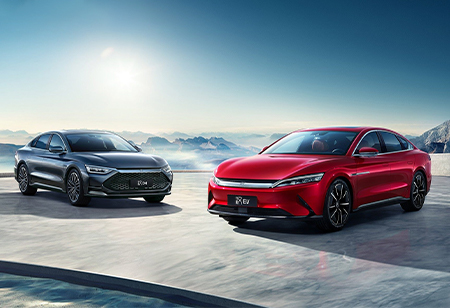
Will Toyota's Latest Technologies Help It Win the EV Race?


The global electric vehicle market was valued at $163.01 billion in 2020 and is expected to reach $823.75 billion by 2030, growing at an 18.2 percent CAGR between 2021 and 2030. The electric vehicle market is divided into several segments: vehicle type, class, top speed, vehicle drive type, and region. Toyota is one among the largest EV manufacturers in the world. The company’s technological prowess has enabled it to overcome previously thought-to-be impossible difficulties, resulting in the development of various vehicles that are ahead of their time and setting the way for the future, such as the Prius, now synonymous with hybrid automobiles and the Mirai fuel cell vehicle. The company is at the forefront of changing the future of automobiles. It continues to lead in creating a future society by leveraging technology to transport customers into the future and connect cars to society.
Toyota’s New Innovations
Toyota has turned to self-propelled assembly lines, enormous die casting, and even old-fashioned hand polishing in plants in Japan's industrial heartland to make up for lost position in battery electric vehicles. The world's best-selling automaker believes it can catch Tesla and others by integrating new technologies with the well-known lean manufacturing practices it has employed for decades to extract inefficiencies, including excess costs, out of manufacturing.
During a facility visit in central Japan, the automaker revealed some of its latest innovations for the first time. It also displayed examples of frugal creativity, such as a method for creating high-gloss bumpers without the need for paint. The bumper's shine is achieved by manually polishing the mold to a mirror finish. In other news, Toyota claims that three-decade-old equipment used to process parts may now be run at night and on weekends after being automated through robots and 3D modeling, resulting in a trebling of equipment production.
"The strength of Toyota's manufacturing lies in our ability to respond to changing times," says Kazuaki Shingo, Chief Product Officer. He emphasized technical and technology competence rooted in TPS, short for Toyota Production System.
Toyota's lean manufacturing, just-in-time delivery, and Kanban workflow organization system transformed modern manufacturing. Its approaches have now been used in everything from hospitals to software companies, and they have been widely researched in business schools and boardrooms throughout the world.
Toyota's unrelenting focus on continual improvement and cost-cutting fueled its rise from postwar upstart to global behemoth. However, in terms of battery, it has been surpassed by another indefatigable innovator, Tesla, which has built market-leading profitability through its own efficiency. According to the reports, the Japanese manufacturer will account for only approximately 0.3 percent of the global EV market in 2022, with a stronger offering being the missing piece in its lineup. It is hardly the only automaker dealing with the hurdles of transitioning to EVs.
Toyota is emphasizing self-propelled production lines, in which EVs are directed through the assembly line by sensors. The technology eliminates the need for conveyor equipment, which is a significant cost in the automobile assembly process, and allows for greater flexibility in manufacturing lines. In a demonstration, EVs inched along without a roof, letting sections be slotted in. A Fanuc robot arm was used to drop the automobile seats into the EV bed. A nearby autonomous forklift removed more seats from a container. Toyota also demonstrated a prototype of Tesla's giga-casting die-casting process, making aluminum parts significantly larger than ever used in auto manufacture. Toyota, like Tesla, says it will build EVs in modular portions to reduce parts. However, it also highlights its own innovations. Because it has been working with die-casting for many years, it has produced molds that can be quickly replaced, which is important on a regular basis in giga casting. Toyota claims that this decreases the time required to change the mold from 24 hours to 20 minutes. It anticipates a 20 percent increase in production.
The manufacturer has also developed a self-driving transport robot at the Motomachi factory in Toyota City that ferries new vehicles across a 40,000 square meter (10 acre) parking area, a job that was previously done by drivers before loading cars onto carrier trucks. Truck drivers walk an average of 8 km (5 miles) every day to get automobiles, consuming driving time and adding to the physical load in a career with a high turnover rate. The automaker stated that it hopes to get ten of the robots operational in Motomachi by next year and will then investigate other sites. It may also sell the robots to other businesses.
Demand for Fuel-Efficient, High-Performance, and Low-Emission Automobiles is Increasing
Because petrol is a fossil fuel, it is not a renewable energy source and will be depleted in the future. Developing and deploying alternative fuel sources to support sustainable development is critical. This includes the usage of electric automobiles, which do not require petrol and are more cost-effective than traditional vehicles. An electric car transforms more than half of the electrical energy from the grid to power the wheels. In contrast, a gasoline-powered vehicle only translates roughly 17-21 percent of the energy contained in gasoline. The recent increase in the price of gas and diesel has raised demand for fuel-efficient automobiles. With rising environmental concerns, governments and environmental organizations around the world are passing tough emission standards and rules to minimize car emissions. Major regulatory initiatives include rigorous emission limits for reducing nitrogen oxides (NOx) and carbon dioxide (CO2) in the atmosphere. Vehicles release large amounts of greenhouse gasses, and federal and state governments in the United States are stepping up efforts to make transportation cleaner.

